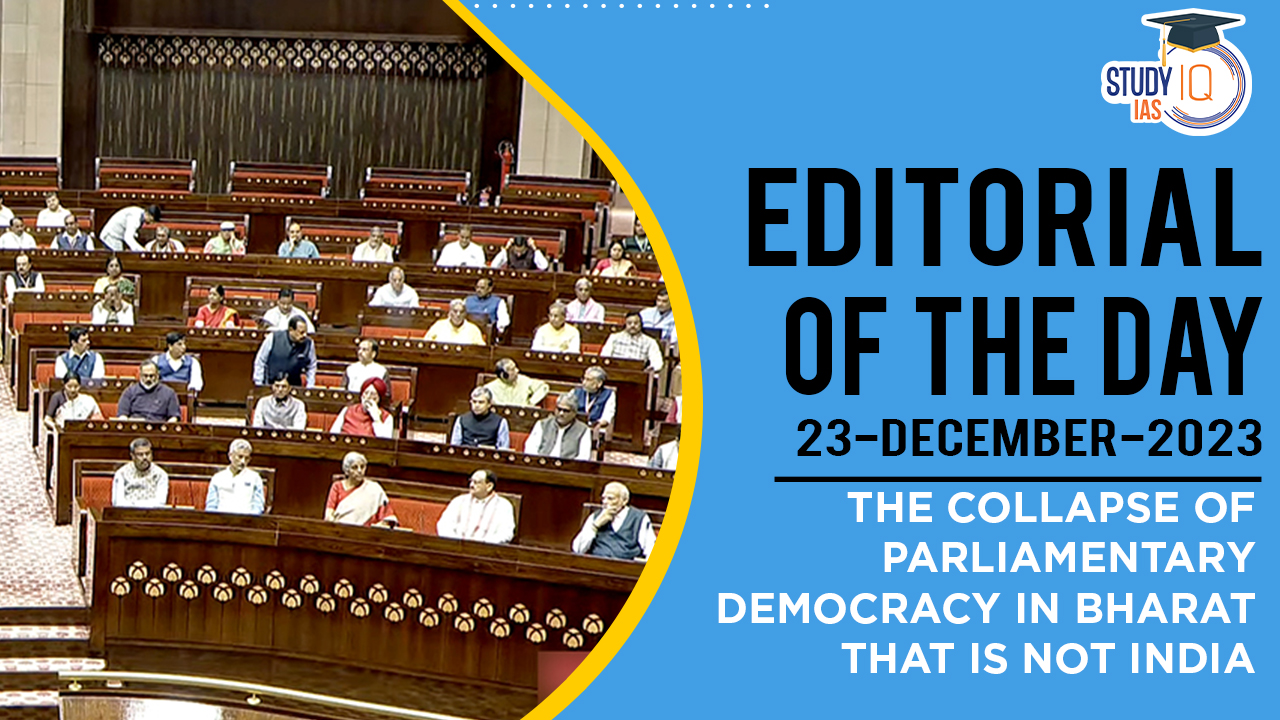Table of Contents
Context: The recent suspension of 140 Members of Parliament in India is viewed by experts as a sign of diminishing strength in the country’s parliamentary democracy.
Concerns About the Decline of Parliamentary Democracy
- Diminishing Parliamentary Essence: Despite constitutional frameworks, power in India is increasingly centralised, contradicting the democratic principle of power distribution.
- Inaction by the Supreme Court: The judiciary’s failure to intervene proactively in the MPs’ suspension case raises questions about its role in upholding constitutional values.
- Media’s Questionable Role: With some exceptions, a significant portion of the media either aligns with the powerful or distracts from critical issues, rather than providing balanced coverage.
- Limited Public Outcry: The lack of substantial public reaction to these developments might indicate a waning interest in constitutional principles.
- Electoral Dynamics and Accountability: While elections are conducted, post-election scrutiny and debate over government policies are minimal.
- Eroding Separation of Powers: The traditional separation between the executive and legislature is weakening, with both branches becoming increasingly intertwined.
- Shift Towards Presidential System Traits: The current political landscape shows traits of a presidential system due to the concentration of power, though neither system inherently ensures liberty.
- Curbing Individual Rights: New legislation like the Criminal Code and Telecommunications Bill is perceived as diminishing individual rights and augmenting state power.
- Centralization of Leadership: Power is seen as being concentrated around the Prime Minister and his party, lacking effective constraints.
- Monopolization of Power: Government power is being used for various ends, some beneficial but ultimately altering the nature of India’s political system.
- Constitution vs. Personality: There’s a growing concern that individual personalities are overshadowing constitutional principles.
We’re now on WhatsApp. Click to Join
Suggested Measures to Reinforce Parliamentary Democracy
- Emphasising Debates and Deliberation: Parliamentary democracy should focus on meaningful debates and discussions among elected legislators on public issues.
- Utilising Committees: Parliamentary and standing committees should be more actively used for in-depth analysis of Bills and legislation.
- Strengthening the Opposition: A robust opposition is crucial for balancing the ruling party’s power and fostering a mature democracy.
- Upholding Dignity in Opposition: Opposition members should engage constructively and respectfully to contribute effectively.
- Maintaining Checks and Balances: The principle of checks and balances is vital to prevent the shift towards majoritarianism, a responsibility largely held by the opposition.


 Phenome India Project: Mapping India's H...
Phenome India Project: Mapping India's H...
 UDAN Scheme, Objectives, Funding and Ach...
UDAN Scheme, Objectives, Funding and Ach...
 Indus Water Treaty 1960 Suspended by Ind...
Indus Water Treaty 1960 Suspended by Ind...





















